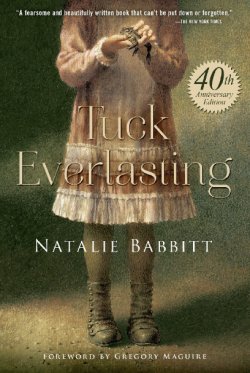Gareth B. Matthews

Review of Tuck Everlasting by Natalie Babbitt (New York: Bantam, 1976). Originally published in Thinking: The Journal of Philosophy for Children 2(3-4): 95.
Thought experiments animate philosophy. Cephalus, in Book I of Plato’s Republic, declares that justice is telling the truth and paying your debts. But suppose, Socrates replies, that you borrow a weapon from a friend who then goes mad; does justice require that you return what you have borrowed? The question is rhetorical. The thought experiment refutes Cephalus’ s theory.
Instead of testing a philosophical theory, a thought experiment sometimes raises a philosophical question. Thus the story of the ship of Theseus (whose boards were gradually replaced, one at a time, until every board in place was new) raises, dramatically and insistently, the question, ‘What changes, if any, can a physical object sustain without ceasing to exist?”
Thought experiments may have yet another philosophical function. Sometimes they help us decide if a certain attitude we have towards something is appropriate. Consider the attitude most of us have to our own mortality. We lament it and we fear the death that, we know, will end our life (even if we hope for a life to come). But are these attitudes towards mortality well placed?
In “The Makropulos case; reflections on the tedium of immortality” Bernard Williams uses a story that Janacek made into an opera to consider whether one is perhaps “lucky in having the chance to die” (Problems of the Self; Cambridge, 1973, 82-100). The heroine of the story takes an elixir of life at age 42 and then lives three hundred years as an arrested 42-year-old. Her enduring life becomes unendurable; in deep and desperate boredom she finally refuses to retake the elixir, and dies. Williams draws the moral from this thought experiment that ”death is not necessarily an evil, and not just in the sense in which almost everybody would agree to that, where death provides an end to great suffering, but in the more intimate sense that it can be a good thing not to live too long.” (83)
Some of those very adults who most need the consolation of philosophy in confronting their own mortality may recoil most vigorously from the suggestion that children can reflect with profit on a thought experiment of this sort. ” Leave them in their blessed innocence,” they may say. But what passes for innocence is, too often, the unspoken agreement not to mention what one has not yet come to terms with.
In Tuck Everlasting Natalie Babbitt has managed to tell an engrossing yarn that nudges one towards the conclusion that any life worth living has a beginning, a middle, and an end. Given the choice between an unendingly arrested childhood and a life of the normal sort, the heroine of the story chooses mortality. And the reader, whether eight or eighty, is likely to approve the choice, or, if not, at least to understand it.
Neither this story nor the Makropulos case exhausts the possible ways of conceiving immortality. Neither one addresses the ancient idea that one might live a succession, perhaps even an end less succession, of discrete lives. Nor does either consider what it would be like to live a life where everyone, not just a “lucky” one, or few, is 17 or 42.
Still, Tuck Everlasting is a good framework for first reflections on mortality. It’s also a good story, well told.
